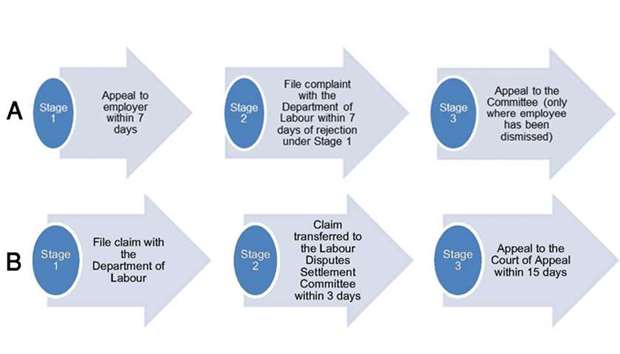Law No. 13 of 2017 (Law No 13) was issued on 16 August 2017, amending certain provisions of the Labour Law (Law No 14 of 2004) and the Civil and Commercial Procedure Code (Law No 13 of 1990), and more recently Cabinet Resolution No 6 of 2018 (Resolution No 6) which was brought into effect on 16 March 2018 to enhance and implement a regulatory framework within which labour disputes will be heard.
Impact of Law No 13
The new law addresses two key areas of the dispute process; the initial disciplinary stage and the dispute stage following a breakdown in the employment relationship.
Disciplinary Sanction Complaint Procedure
Law No 13 clarifies the complaint procedure employees must undertake when seeking to appeal a disciplinary penalty imposed by their employer, or dismissal following an internal employment disciplinary process.
Stage 1
In the first instance employees are required to appeal such penalty directly with their employer within seven days of being notified of the same. The employer in turn has a window of seven days in which to consider the appeal and respond. In instances where the employer does not respond, such silence will constitute a rejection of the employee’s appeal.
Stage 2
Where an employee’s appeal to the employer is rejected, the employee may file a complaint with the Department of Labour (the Department) for their review and adjudication. Similarly to Stage 1, where the Department does not issue its decision within the statutory imposed timeframe, such silence will constitute a rejection of the employee’s complaint. The Department’s decision is final save for instances set out in Stage 3 below.
Stage 3
In circumstances where the employee has been dismissed following a company disciplinary process, and the employee is dissatisfied with the outcome of Stage 2, the employee may appeal such decision to the new Committee. The Committee is empowered to repeal such dismissal and reinstate the employee in instances where the Committee finds that the employee’s dismissal was arbitrary. The Committee may also order that the employee receive his or her salary for the period of unemployment, or alternatively, reasonable compensation in line with their remuneration package received prior to the dismissal.
Labour Dispute Settlement Procedure (Illustration A)
Law No. 13 introduces some additional articles to the Labour Law setting out the procedural steps parties are required to follow in instances where the employment relationship breaks down.
Stage 1
Either party may refer the dispute to the Department (where the dispute involves a foreign national, or where the dispute involves a Qatari national, the relevant competent department). The Department is obliged to seek to have the dispute settled within seven days of the application being made. In circumstances where the parties have agreed to settle, they will be required to sign minutes of their settlement meeting which will subsequently be certified by the Department.
Stage 2
Where the parties fail to amicably settle their dispute, the Department will transfer the matter to the Committee. The Department will also transfer the applicable documentation to the Committee together with their observations. Within three working days of the dispute being referred, the Committee is subsequently obliged to set a date for the case to be heard and notify the parties. The Committee is obliged under the new law to resolve the dispute within three weeks of the initial hearing.
Stage 3
Parties wishing to appeal the Committee’s decision can file their appeal with the Court of Appeal within 15 days of the Committee’s decision.
(Illustration B)
All new disputes are required to follow the above procedure laid out; parties are not permitted to bypass the Department and Committee stages.
Labour Disputes Settlement Committee
Resolution No 6 sets out in more detail the formation of the Committee and the extent of its authority and procedural requirements. Pursuant to the new resolution, three committees will oversee labour disputes, each comprising of a chairperson who is a Court of First Instance judge together with two additional members. The names of such individuals are detailed in the resolution.
In terms of procedural requirements, Resolution No 6 lays down guidelines which the Committee is required to follow. In particular, the resolution provides that the Committee is required to meet three times per week, with their sessions being held in public. The Committee has the discretion to hear or request verbal evidence, it may consolidate cases having the same subject matter and parties and it may rule on matters in absentia or dismiss the case altogether where a party is not in attendance. Procedural restrictions, such as not being permitted to postpone proceedings more than once for the same reason, are also imposed.
Disputes currently being heard by the Qatar courts will continue to be concluded by them without the need to instigate a new claim with the Committee.
Implications of the New Process
The introduction of the Committee is a welcomed addition to the judiciary which will undoubtedly have a positive impact on labour disputes moving forwards. The clearly set out timeframes and procedural framework in which the Committee is expected to operate within is likely to increase efficiency and transparency in employment disputes.
Note: Qatari Laws (save for those issued by, eg QFC to regulate its own business), are issued in Arabic and there are no official translations, therefore for the purposes of drafting this article Clyde & Co LLP has used its own translations and interpreted the same in the context of Qatari laws, regulation and current market practice. Should you have any questions in connection with this article or the legal issues it covers, please contact Emma Higham ([email protected]).

